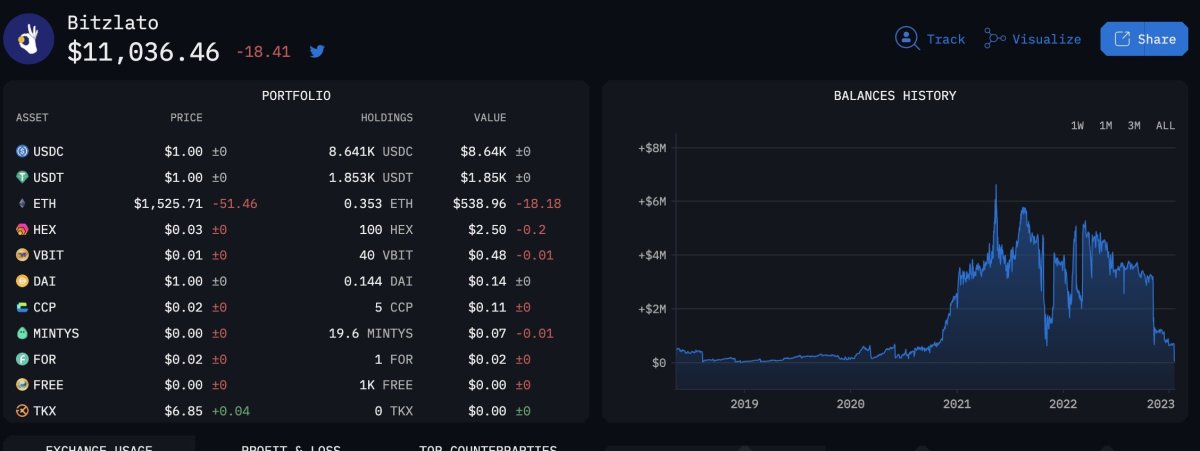Bitzlato: The entire world of crypto was on the edge of its seat yesterday when the US Justice Department (DoJ) announced a mysterious press conference that would soon surface details of a “major international cryptocurrency action.”
In the minutes following the DoJ’s first announcement, the price of Bitcoin (BTC) and Ethereum (ETH) both plummeted 5% as crypto investors whipped up a storm of anxiety, legitimately fearing that another FTX-like collapse of a major market player was just around the corner.
And so, when the Department of Justice finally came forward and announced that they had shut down a tiny Hong-Kong based crypto exchange called ‘Bitzlato’ on money laundering charges, crypto enthusiasts were left open-mouthed.
Bitzlato? What the hell is Bitzlato?
Don’t just take it from me.
Frank Chaparro, editor-at-large at The Block, one of the largest publications in crypto media, was stunned by the announcement, saying that in his six years of covering crypto events he’d never heard so much of a whisper of Bitzlato.
One of the more interesting parts of this entire fiasco has been the coverage of the event in the mainstream press. Mainstay news outlets like The Guardian and the BBC are covering the news as though the exchange was something of importance in the world of cryptocurrency, but as we’ve just learned, quite literally no one had ever heard of it.
Understandably, the vast majority of crypto personalities were disappointed by the Justice Departments’ takedown of Bitzlato, especially when considering that many in the crypto space are already frustrated with US authorities for failing to take any significant action against much larger crypto firms such as FTX, Three Arrows Capital, Voyager Digital and BlockFi until they were forced to file for bankruptcy.
What actually happened with Bitzlato?
In a team effort, the US Justice Department and Treasury Department charged the Hong Kong-based crypto exchange Bitzlato Ltd. with money laundering and arrested its founder, Anatoly Legkodymov in Miami
Legkodymov is a Russian national who reportedly goes by the alias “Gandalf,” in some crypto circles.
The authorities claimed that Legkodymov failed to establish anti-money laundering requirements for Bitzlato, which allowed the firm to process more than US$700 million in illegal, criminal-linked funds over the course of its seven-year history, mostly processing illicit transactions related to the dark web marketplace Hydra.
Without so much as a hint of irony, Deputy Attorney General Lisa Monaco paraded the crackdown on Bitzlato and the arrest of its founder Legkodymov as “a significant blow to the crypto crime ecosystem,” and the removal of foundational player in what she dubbed the “high-tech axis of crypto crime.”
It’s worth noting that when contrasted with the size of other major crypto exchanges like Binance — which accounted for more than US$7 trillion in trading volume over the course of 2021 — Bitzlato is microscopic by comparison. According to data from the crypto analytics firm Arkham Intelligence, the exchange at its peak never held any more than a total of US$6 million in funds.

The memes that followed
One meme in particularly captured the overarching attitude towards the DoJ’s announcement, depicting Bitzlato as a feather aimed at a self-sacrificing soldier (the DoJ), while knives and hand grenades labeled FTX, Celsius, Voyager and BlockFi all rained down on a sleeping civilian.
Another meme from prominent crypto trader Gainzy was a little more childish, but also encapsulated the response from the crypto community with impeccable flair.
Despite the resounding derision being flung at the DoJ from those in cryptoland, some were more forgiving of the move, saying despite how the actions were announced, the removal of Bitzlato is undeniably a good thing for the industry.
“I also heard about Bitzlato for the first time today, but (despite the funny memes) the DOJ’s action makes clear that they will prosecute those who exploit the crypto ecosystem to commit crypto crimes. That’s good policy,” Stuart Alderoty, general counsel at Ripple, said in a tweet.





